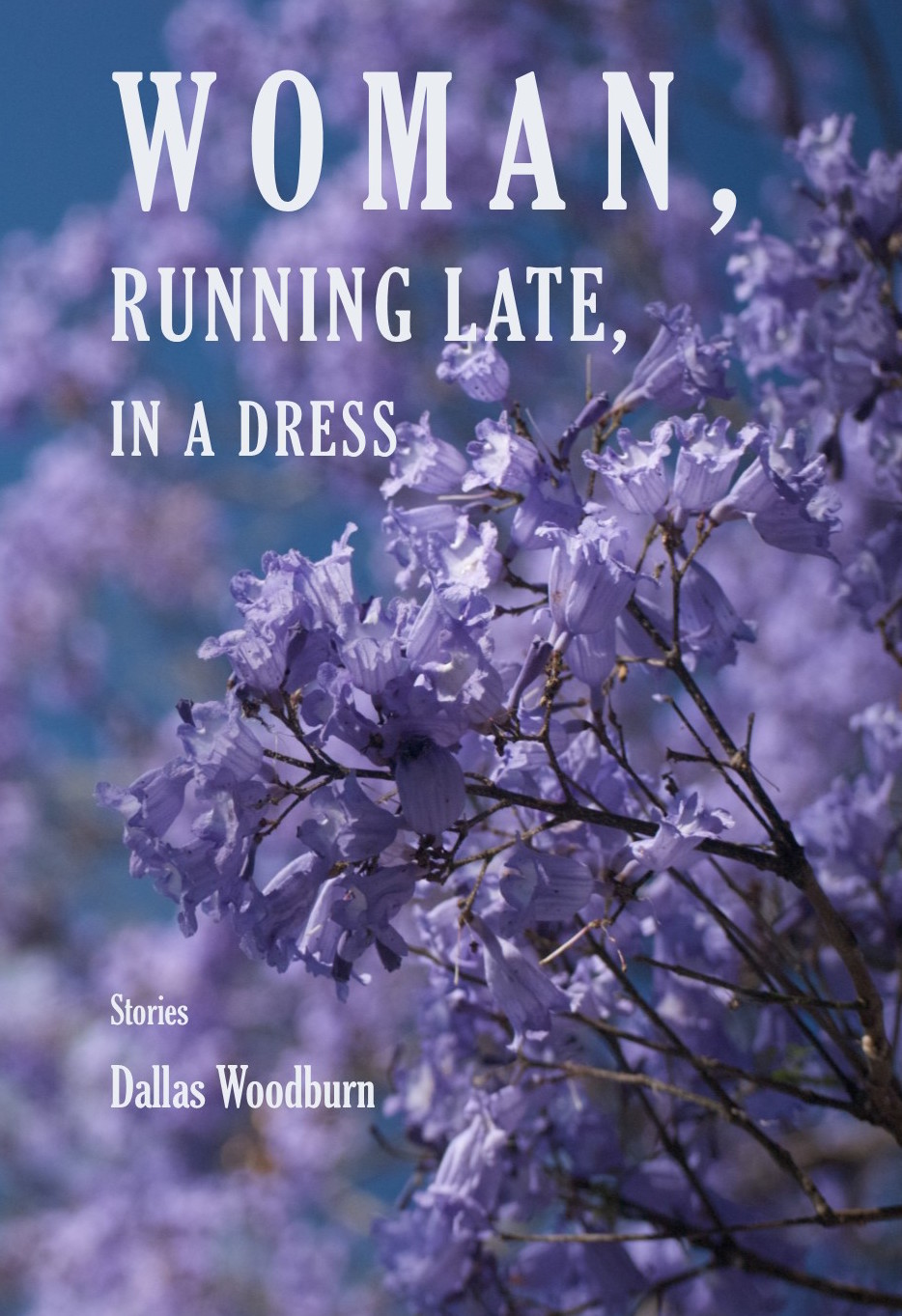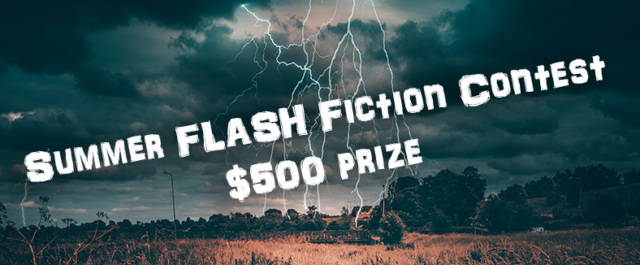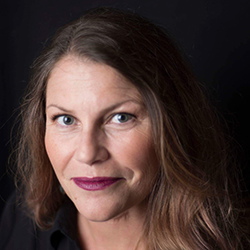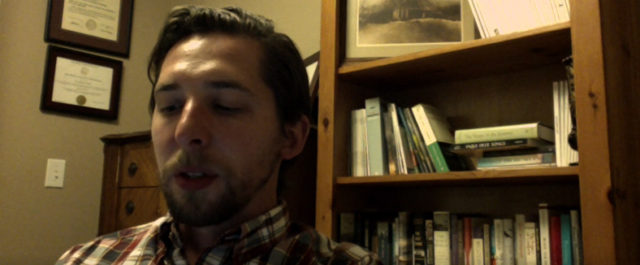Mel Sherrer
 This month, South 85 Journal sat down with Dallas Woodburn, author of the newly released Woman, Running Late, in a Dress, to discuss the nature of short stories, character relatability, the role of irony, and much more.
This month, South 85 Journal sat down with Dallas Woodburn, author of the newly released Woman, Running Late, in a Dress, to discuss the nature of short stories, character relatability, the role of irony, and much more.
S85: Firstly, why short stories for this collection [Woman, Running Late, in a Dress], rather than a novel or novels?
DW: In many ways, short stories are my first love. Stories were the first thing that I ever started writing, way back in elementary school, and I’ve been writing them ever since. I’ve heard it said that stories are a great way to “hone your chops” as a writer because they are shorter in length than a novella or a novel, but I do think there is quite a difficulty in writing something so compressed. I have since written three novels and the challenges of writing a novel versus writing a short story are very different, but I would say that each is equally demanding in its own way. With these stories in particular, I was inspired by collections of stories like Jennifer Egan’s A Visit from the Goon Squad and Elizabeth Strout’s Olive Kitteridge, where the stories are interconnected and form a novel of sorts in vignette form. I was curious to take on this challenge myself and to explore the ways that the lives of my characters converge and interact with each other, often in surprising ways. One of the pleasures of writing this collection was that I was able to revisit characters from new angles and from new points in their lives and watch how they grow and change during the course of the book. I hope the reader finds pleasure in this aspect as well.
S85: Your characters, at times, are incredibly relatable; is character relatability the focus of your character development process, or does it evolve naturally as the plot demands?
DW: What a great question! While I do want my characters to be relatable, I wouldn’t say that it is a focus of mine while I am writing. My goal as a writer is to understand my characters and to help the reader understand them deeply, below the surface level. This is why I believe that reading and writing fiction makes us better and more empathetic human beings. I believe that once we understand someone, either a character or a person in real life, then we are able to relate to them on a much more profound and authentic level. So yes, I would say the relatability of my characters does evolve naturally as the plot unfolds and as I learn about the secret underpinnings of their hearts. My characters might not always be likeable, but their mistakes, quirks and foibles are what make them human.
S85: These stories are quite emotive, what are some of your tactics for rendering character emotion?
DW: Thank you. As with the previous question, I would say that rendering character emotion is not something that I consciously think about while I am writing a first draft. Rather, emotion is something that I am able to access when I understand my characters deeply enough. Writing fiction reminds you again and again how similar we all are–after all, we all feel these emotions. The circumstances and situations that my characters face may be completely different than my experiences, but I have felt all of the emotions that my characters feel and when I am writing I simply try to tap into this well of emotion inside myself. I also think that sometimes quieter moments can be even more powerful than loud crashes and bangs of feeling.
S85: What do you feel themes such as loss, grief, and trauma reveal about human nature, which themes such as, joy and celebration may not?
DW: Wow, this question is really making me think! This reminds me of when my grandma asked me why so many of my stories are so sad. But the funny thing is, I don’t think of my stories as sad. Even when the characters undergo terrible losses, there is always hope to be found. I like to think that the sadness and pain and grief of my characters showcases a hope and resilience that is more stunning because of its juxtaposition with pain. In my own life, when I am going through times of grief and loss, it is then that I feel most compelled to write and to read and to find community in the stories of others.
In real life, my beloved grandfather’s house burned down this past December in the horrific Thomas wildfire that tore through his neighborhood and ravaged my hometown. So much destruction. So much loss. So much devastation and grief. And yet… there were also miracles to be found. Miracles like a rosebush in his backyard planter, named after Audrey Hepburn, which my grandfather planted 25 years ago after my grandma Audrey died. This rosebush withstood the deadly flames burning all around it and continues to grow today. It reminds me that sometimes, after everything has been razed to the ground… that is when the most gorgeous blooms unfold.
As a writer, you want to investigate and explore conflict, so I think that is why so much of fiction is born from suffering – like Chekhov’s famous line, “Happy families are all alike; every unhappy family is unhappy in its own way.” At the same time, I agree with you that human resilience in the face of trauma and grief shows that we are not alone in these experiences. I think expressing our pent-up words and sharing them — if not with the world, then at least with the pages of our journals — is such an important part of healing.
S85: What role does irony play in crafting the plot in your stories?
DW: To me, irony is a difficult thing to plan out and think about consciously when I’m writing. If I were to try to craft an ironic moment, it would fall flat and seem forced. This could be because my creative process stems much more from character then it does from plot. I am not one of those writers who outlines my plot before I begin — I usually have only a vague idea of where the story is headed. However, one of my favorite parts of the writing process is when unanticipated connections, twists and turns, and yes, ironic moments, spring up and it almost feels like you the writer are magically pulling them from the ether.
S85: There are symbols throughout Woman, Running Late, in a Dress which in ways, masterfully weave the stories together; what are your thoughts on crafting meaningful symbolism in short stories?
DW: Symbols can be so powerful in fiction — especially when they are not overdone. I teach my students not to beat the reader over the head with symbols. You have to trust that the reader will be smart enough to see what you are hinting.
When writing symbols, I like to follow Stephen King’s advice from his wonderful book On Writing where he advises in large part not to think of symbols too much as you are writing the first draft. Instead, when you read through your writing symbols will naturally be found – like Easter eggs left there from your subconscious — and your role when revising is to notice these symbols and heighten them. For example, in a few of my stories I noticed the color red springing up. Red can be a symbol of many things. In my stories, it became a symbol of vitality and sensuality and betrayal and life. When I noticed this color in multiple stories, I realized that it was a symbol for my characters and I tried to heighten it and pay a little bit more attention to it, whether it came in the form of a red dress or red lipstick or a red T-shirt.
I also believe that symbols can also come naturally from place, which is how symbols such as the jacaranda trees and the fog and the ocean came into my collection. I was just exploring the surroundings of my characters to try to understand them on a deeper level. In a collection like mine where the stories are linked, I think you are right that symbols are even more important to weave the pieces together and give the reader a sense of cohesion across the multiple storylines.
S85: What is your intent or vision for this collection of stories? What would you say you want readers to experience reading Woman, Running Late, in a Dress?
DW: My intent for this collection is the same as my intent for all of my writing, which is that the reader be fully immersed in these other lives and come out of the book with a sense of connection. To put it simply, I want to the reader to know and to feel that they are not alone. I hope that my readers find moments of beauty and pain and grace in my stories. I hope that there are moments when they blink tears from their eyes and moments when they laugh to themselves and moments when the real world falls away and all that exists is the world on the page. I hope that these characters stay with them in the same way my favorite characters have become dear people in my own life. I hope that readers get that special swelling in their chest that happens when you finish a book that, as Holden Caulfield says in Catcher in the Rye, really “knocks you out” and sigh that wistful, contented sigh as they close the cover and just want to turn back to page one and read the whole thing again.
About the Author
 Dallas Woodburn, a 2013-14 Steinbeck Fellow in Creative Writing at San Jose State University, is a writer of fiction, nonfiction, and plays. Her collection of short stories Woman, Running Late, in a Dress was published in March 2018 by Yellow Flag Press. The book is available for purchase online: http://bit.ly/womanrunninglate. Find out more about Dallas Woodburn and Woman, Running Late, in a Dress at: http://dallaswoodburnpr.com/.
Dallas Woodburn, a 2013-14 Steinbeck Fellow in Creative Writing at San Jose State University, is a writer of fiction, nonfiction, and plays. Her collection of short stories Woman, Running Late, in a Dress was published in March 2018 by Yellow Flag Press. The book is available for purchase online: http://bit.ly/womanrunninglate. Find out more about Dallas Woodburn and Woman, Running Late, in a Dress at: http://dallaswoodburnpr.com/.
About the Interviewer
 Mel Sherrer is a performance poet and teacher living in San Marcos, Texas. She is the Managing Poetry Editor for South85 Literary Journal.
Mel Sherrer is a performance poet and teacher living in San Marcos, Texas. She is the Managing Poetry Editor for South85 Literary Journal.






 Diana Raab, PhD, MFA, is an award-winner writer, speaker, and workshop facilitator. She is the author of nine books including, her latest, Writing for Bliss: A Seven-Step Plan for Telling Your Story and Transforming Your Life. She facilitates workshops in writing for transformation and empowerment, focusing on journaling, poetry, and memoir writing. She believes in the importance of writing to achieve wholeness and interconnectedness, which encourages the ability to unleash the true voice of your inner self. Visit her at
Diana Raab, PhD, MFA, is an award-winner writer, speaker, and workshop facilitator. She is the author of nine books including, her latest, Writing for Bliss: A Seven-Step Plan for Telling Your Story and Transforming Your Life. She facilitates workshops in writing for transformation and empowerment, focusing on journaling, poetry, and memoir writing. She believes in the importance of writing to achieve wholeness and interconnectedness, which encourages the ability to unleash the true voice of your inner self. Visit her at 
 Gwen Holt was raised in the wilds of rural Idaho but found her heart in New York City. She worked at many interesting jobs before settling in as a mother and writer. She now resides in North Carolina with her husband, four children, eight chickens, a fluffy dog, and two suspected serial killer cats. She has an MFA in Young Adult literature with Converse College and has served South 85 Journal as a Fiction Editor. She is the winner of the Southeast Review 2016 Narrative nonfiction prize for her short story, “The Ditch Bank and the Fence Line,” and will publish her fourth novel for young adults, Imani Unraveled, this fall with Owl Hollow Press.
Gwen Holt was raised in the wilds of rural Idaho but found her heart in New York City. She worked at many interesting jobs before settling in as a mother and writer. She now resides in North Carolina with her husband, four children, eight chickens, a fluffy dog, and two suspected serial killer cats. She has an MFA in Young Adult literature with Converse College and has served South 85 Journal as a Fiction Editor. She is the winner of the Southeast Review 2016 Narrative nonfiction prize for her short story, “The Ditch Bank and the Fence Line,” and will publish her fourth novel for young adults, Imani Unraveled, this fall with Owl Hollow Press.






 Gabrielle Brant Freeman‘s poetry has been published in many journals, including Grist, One, Scoundrel Time, Shenandoah, and storySouth. She was nominated for a Pushcart Prize in 2017, and she was a Best of the Net 2014 finalist. Gabrielle won the 2015 Randall Jarrell Competition. Press 53 published her book, When She Was Bad, in 2016. Read her poems and more at
Gabrielle Brant Freeman‘s poetry has been published in many journals, including Grist, One, Scoundrel Time, Shenandoah, and storySouth. She was nominated for a Pushcart Prize in 2017, and she was a Best of the Net 2014 finalist. Gabrielle won the 2015 Randall Jarrell Competition. Press 53 published her book, When She Was Bad, in 2016. Read her poems and more at 

 Aaron
Aaron
 Leigh Statham was raised in the wilds of rural Idaho but found her heart in New York City. She worked at many interesting jobs before settling in as a mother and writer. She now resides in North Carolina with her husband, four children, eight chickens, a fluffy dog, and two suspected serial killer cats. She is pursuing an MFA in Young Adult literature with Converse College and has served South 85 Journal as a Fiction Editor under the name Gwen Holt. She is also the winner of the Southeast Review 2016 Narrative nonfiction prize for her short story, “The Ditch Bank and theFence Line.”
Leigh Statham was raised in the wilds of rural Idaho but found her heart in New York City. She worked at many interesting jobs before settling in as a mother and writer. She now resides in North Carolina with her husband, four children, eight chickens, a fluffy dog, and two suspected serial killer cats. She is pursuing an MFA in Young Adult literature with Converse College and has served South 85 Journal as a Fiction Editor under the name Gwen Holt. She is also the winner of the Southeast Review 2016 Narrative nonfiction prize for her short story, “The Ditch Bank and theFence Line.”
 Cinelle Barnes is a creative non-fiction writer and educator from Manila, Philippines. She writes memoirs and personal essays on trauma, growing up in Southeast Asia, and on being a mother and immigrant in America.
Cinelle Barnes is a creative non-fiction writer and educator from Manila, Philippines. She writes memoirs and personal essays on trauma, growing up in Southeast Asia, and on being a mother and immigrant in America. Katie Sherman is a freelance journalist in Charlotte, NC. She is currently pursing an MFA degree at Converse College. She has an affinity for Southern Gothic literature, cider beer, Chicago, and morning snuggles with her girls — Ella and Addie.
Katie Sherman is a freelance journalist in Charlotte, NC. She is currently pursing an MFA degree at Converse College. She has an affinity for Southern Gothic literature, cider beer, Chicago, and morning snuggles with her girls — Ella and Addie.